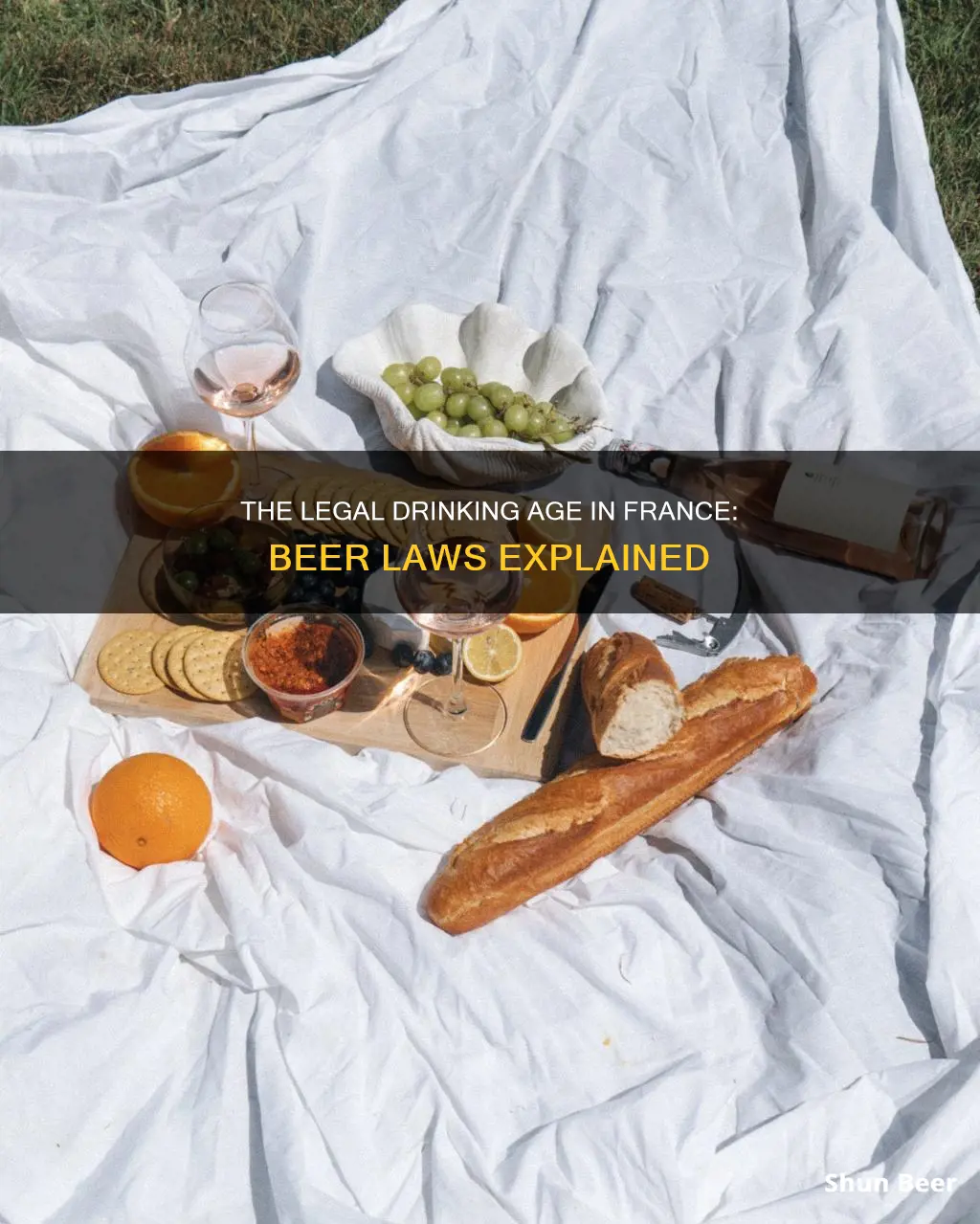
France has a reputation for being a country of wine lovers, and for many years, there was no legal drinking age. However, the drinking laws in France have changed in recent years, and now the legal drinking age is 18.
Until 2009, it was legal for 16-18-year-olds to drink fermented beverages, such as cider, wine and beer, but the laws have changed, and now the minimum age is 18 for all alcoholic drinks.
| Characteristics | Values |
|---|---|
| Legal drinking age in France | 18 years |
| Drinking age for beer in France | 18 years |
| Previous drinking age for beer in France | 16 years |
| Age at which alcohol can be purchased in France | 18 years |
| Age at which alcohol can be consumed in bars or restaurants in France | 18 years |
| Age at which alcohol can be consumed in the presence of adults in France | 16 years |
What You'll Learn

Drinking laws in France
In France, the legal drinking age is 18 years old. This applies to both the consumption and purchase of alcohol. From the age of 16, French teenagers may order alcoholic drinks in restaurants if they are accompanied by their adult guardians.
The drinking age in France used to be more relaxed, with 16-18-year-olds allowed to drink "fermented" beverages such as cider, wine and beer. However, in 2009, the laws changed, and the drinking age was raised to 18 for all alcoholic drinks. This change was brought about by a staggering increase in teen hospitalizations caused by binge drinking, as well as growing health concerns and emerging research on the effects of alcohol on developing bodies and brains.
Public drunkenness is prohibited in France and is punishable by law. There is no set alcohol level to determine drunkenness, and law enforcement personnel make decisions on a case-by-case basis. Drunk driving is also illegal and can result in fines of up to €135. The maximum permitted alcohol level for drivers is approximately the equivalent of three half-pints of beer, two glasses of wine, or three glasses of champagne.
France has a unique drinking culture, with wine being a significant part of its history, cuisine, and national identity. While wine consumption is on the decline, drinking is still a common and accepted practice, often accompanied by food. It is not unusual to see French teenagers drinking wine or beer in public places, and drinking in parks is generally tolerated, although technically illegal.
French drinking etiquette includes the custom of drinking in moderation and treating alcohol as a marathon, not a sprint. Drinking is often accompanied by food, and there are specific drink categories related to food, such as apéritifs and digestifs. Toasting is also an important part of French drinking culture, with individuals making eye contact and clinking glasses individually while saying "Santé!".
Boxers and Beer: A Healthy Relationship?
You may want to see also

Drinking age history
France has a reputation for being a country of wine lovers, and it is true that wine is a big part of the French national identity. However, the country's relationship with alcohol has changed over the years, and so has the legal drinking age.
Pre-1950s
Alcoholic drinks have been available in France since their invention, and wine, in particular, has been considered an integral part of French culture, cuisine, and the economy. In fact, until the 1950s, it was common for French schoolchildren to drink wine, and other alcoholic drinks like beer and cider, with their meals. This was due to the belief that alcohol had a beneficial effect on children's development and that it was safer to drink than potentially contaminated water.
1950s
In 1956, France passed a rule prohibiting the sale of alcoholic beverages to anyone under the age of 14 in school canteens. However, underage drinkers above 14 were still not protected by the law, and alcohol continued to be served in high schools until 1981.
1980s
In 1981, under the presidency of Francois Mitterrand, a ban on alcoholic beverages in secondary schools was finally implemented for all pupils aged 14 and above.
2000s
By the early 2000s, a significant number of French teenagers had begun to experiment with binge drinking. In 2009, Health and Sports Minister Roselyne Bachelot passed a law that raised the legal drinking age to 18 for the consumption and purchase of all types of alcoholic beverages. Those under 18 are also not allowed to be sold or served alcohol in bars, shops, and public places. However, 16 and 17-year-olds are allowed to drink when accompanied by adults, usually family members.
Present Day
Today, the legal drinking age in France is 18, and establishments serving alcohol are required to verify proof of age. While the French still consume a significant amount of alcohol, with wine being the drink of choice, they tend to drink in moderation and as part of a meal.
Vodka and Beer: Mixing Alcohol Safely and Responsibly
You may want to see also

Drinking culture
France has one of the highest alcohol consumption rates in Europe, with wine representing 58% of the country's total alcohol consumption. In 2021, France produced 962,088 gallons of wine, making it one of the world's top wine producers. Despite this, only one in ten French people drink alcohol every day.
Wine has long been considered an integral element of French culture, cuisine, and the nation's economy. Historically, wine was viewed as a healthy and fortifying drink, even for children. Until the 1950s, a liter of wine a day was considered reasonable, and it was common for schoolchildren to have a small bottle of wine or cider with their packed lunch. However, emerging research on the impact of wine on health has led to changing attitudes and behaviours. In 2009, the legal drinking age in France was changed to 18 years for all types of alcoholic beverages, with those under 18 only allowed to drink when accompanied by adults.
The French drinking culture is known for its emphasis on moderation and balance. Binge drinking is uncommon, as most French children are introduced to alcohol at a young age within the family setting, reducing the secrecy and curiosity surrounding it. Drinking is often accompanied by food, whether it be a full meal or snacks like peanuts, charcuterie, or cheese. The French also tend to drink slowly, savouring each sip and pairing their drinks with the right food. For example, red wine is paired with meat or tomato-based dishes, while white wine is paired with seafood.
French drinking etiquette includes making eye contact when saying "cheers" and waiting until everyone has been served before taking the first sip. Drinking is also not rushed, as waiters will not hurry patrons who are taking their time with their meal or drinks. This culture of taking one's time to enjoy drinks and company is reflected in the French expression, "à votre santé," which translates to "to your health."
Beer Overconsumption: Skin Light Spots and Health Risks
You may want to see also

Drinking etiquette
In France, the legal drinking age is 18. However, 16-year-olds are permitted to drink if they are in the presence of adults, usually family members.
Toasting
Before taking your first sip, it is considered proper etiquette to toast. The French do not say 'cheers' but instead say 'A ta santé' ('to your health') or 'À la tienne' ('to yours'). It is considered rude not to look people in the eye when clinking glasses. You should also wait until everyone has a full glass before starting to drink.
Drinking slowly
The French tend to drink slowly, savouring their drinks. It is also customary to comment on your drink with an approving "Mmmm".
Drinking with meals
In France, drinking is often linked to eating food. It is uncommon to drink wine by itself. Beer is also considered a before-dinner drink or something to have with a light lunch.
Drinking and dining customs
- It is customary to pair your drinks with the right food. For instance, red wine goes with red meat, white wine with poultry and fish, and rosé with appetizers or snacks.
- It is considered rude to set your glass down without at least moistening your lips after a toast.
- It is not customary to refill your glass unless it is completely empty.
- In a fancy restaurant, a waiter will fill your glass. It may be considered rude to pour your own drink.
- In traditional French table etiquette, women do not pour their own drinks. Men are expected to fill the glasses of the women sitting next to them. However, this is becoming less common.
- It is not customary to drink wine at 5 pm. The French tend to have dinner around 7:30-8:30 pm, so the earliest they will drink is around 6:30 pm.
Beer and Keppra: Is It Safe to Drink?
You may want to see also

Drinking and driving
In France, the legal drinking age is 18 years old. This covers fermented alcohols such as beer, wine, cider, hard liquor, and cocktails. From the age of 16, French teens may order alcoholic beverages in restaurants in the presence of their adult guardians.
It is important to note that the penalties for drunk driving in France can vary depending on the specific circumstances and the severity of the offence. For example, if you are involved in an accident while driving under the influence, the consequences can be more severe. Additionally, the police have the discretion to take intoxicated individuals to a "drunk tank" to sober up, regardless of their BAC level.
To avoid any legal issues and ensure your safety and the safety of others, it is best to refrain from drinking and driving altogether. If you plan on consuming alcohol, make sure to arrange alternative transportation methods, such as public transport, taxis, or a designated driver. By following these guidelines, you can enjoy your time in France responsibly and legally.
Mixing Beer and Red Wine: A Good Idea?
You may want to see also
Frequently asked questions
The legal drinking age in France is 18.
16-year-olds can drink alcohol in France if they are accompanied by an adult or guardian.
Drinking in public is allowed in France, but there are some areas where public alcohol consumption is restricted after 4 pm.
Drinking and driving is illegal in France. The limit is 0.5 g of alcohol per litre of blood.







